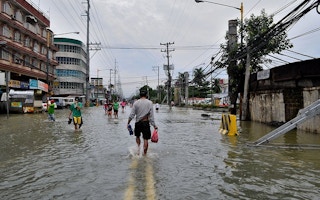When governments from around the world submitted their Nationally Determined Contributions (NDC) plans for the Paris Agreement, they identified water as key to adaptation in 93 per cent of the plans. Clearly, the disruption of the water cycle due to climate change is worrying every policymaker.
Responding to this, the UN Framework Convention on Climate Change (UNFCCC) organised an “action day for water” at the November 7-18 climate summit in Marrakesh, Morocco.
Recognising that water is fundamental for food security, human health, energy production, industrial productivity, biodiversity, and basic human needs, it ended up with a call to governments to pay more attention to water to provide solutions that will help implement the Paris Agreement.
Additionally many efforts to reduce greenhouse gas (GHG) emissions depend on reliable access to water. The climate summit’s host government, Morocco, has put together a book that compiles successful attempts to adapt water availability to climate change impacts.
“
Water is one of the most impacted resources, but water also provides solutions to these challenges.
Benedicto Braga, president, World Water Council
Releasing the book, Charafat Afailal, Morocco’s Minister in charge of Water, said, “We need to realise what is at stake, since water insecurity leads to increased conflicts, tension between populations, and also provokes migration that threatens overall stability.”
Climate change is increasing the frequency and intensity of droughts, floods and storms, and is raising the sea level. All of this has to do with water.
Benedito Braga, president of the World Water Council, said at the event, “While humanity experiences increasing demographic and socioeconomic stresses, recent episodes of extreme climate around the world bring additional complexities in finding solutions to reduce these stresses. Water is one of the most impacted resources, but water also provides solutions to these challenges.”
There have been some successes in attempts to provide such solutions, notably in integrated management of the Hai River in China, strengthening of the new Mexico Metropolitan Organisation for urban flooding drainage, the joint adaptation project of European and Andean countries and providing a hydrological information system for the transboundary Congo river.
Roberto Ramirez de la Parra, president of the International Network of Basin Organisations, said, “Adaptation of water resources to climate change must be organised at the natural level of national or transboundary basin of rivers, lakes and aquifers, and mobilise all actors in the field, including local authorities, economic sectors and civil society to achieve a common vision to face the climate change challenges.”
This story was published with permission from The Third Pole.










